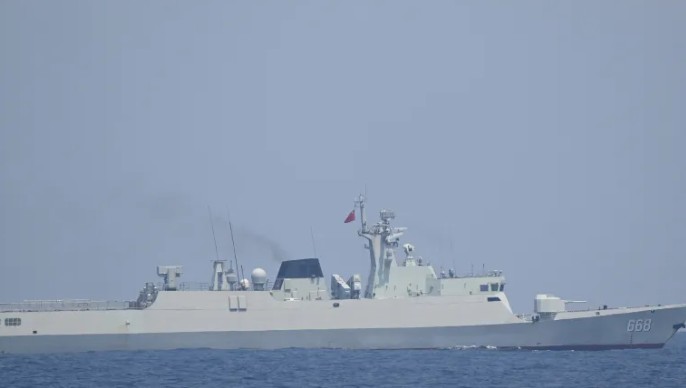China Warns Philippines Amid Routine Patrols in South China Sea

China’s military declared on Sunday that it has carried out what it calls “routine patrols” in the South China Sea, and issued a stern warning to the Philippines against any provocations. The announcement came amid an escalating maritime standoff in the region that has already seen clashes between coast guard vessels and various naval exercises.
According to a spokesperson for China’s Southern Theater Command, the patrols took place over Friday and Saturday. During a statement, Senior Colonel Tian Junli demanded that Manila cease provocations, particularly those involving foreign powers. He said the Philippines’ attempts to involve external forces in joint patrols are “doomed to be futile.” Tian accused the Philippine side of spreading “illegal claims” and undermining regional peace and stability by escalating tensions.
China’s warning also referenced recent plans to establish a nature reserve at Scarborough Shoal a hotspot for tensions between Beijing and Manila while the Philippines continues to protest what it sees as encroachment on its sovereign rights. Filipino fishermen and authorities have expressed concern that such moves amount to de facto control over disputed territories.
Historical & Strategic Background
Territorial disputes in the South China Sea have long been a major challenge for regional stability. Several countries, including the Philippines, Vietnam, Malaysia, Brunei, Taiwan, and China all have overlapping claims. China asserts control over nearly all of the sea through its “nine‑dash line” claim, which has been strongly rejected by other claimants.
In 2016, an international tribunal in The Hague ruled that many of China’s expansive claims lacked legal basis under the United Nations Convention on the Law of the Sea (UNCLOS), particularly as they pertain to the Philippines’ exclusive economic zone (EEZ). China has rejected that ruling.
Scarborough Shoal, also known as Huangyan Island in China and Panatag Shoal by the Philippines, is a small coral reef area about 200 km off the Philippine coast. It has been under de facto Chinese control since 2012, and China’s recent move to designate it as a nature reserve is viewed by many as both a conservation measure and a strategic posture to tighten its grip on the feature.
Implications & What to Watch
This renewed warning from China comes amid increasing joint naval exercises between the Philippines, the U.S., and Japan in the Philippine EEZ. These collaborations are frequently cited by Beijing as provocations that risk destabilizing regional order.
The Philippines has protested China’s reserve plan at Scarborough Shoal, calling it illegal under international law and warning of potential harassment of Filipino fishermen. The move raises concerns not only about sovereignty but also about livelihoods and access to traditional fishing grounds.
Internationally, there could be diplomatic ripple effects. The U.S. and other allies are likely to view China’s behavior through the lens of broader competition in the Indo‑Pacific, especially around freedom of navigation and international norms. Escalation is possible if incidents at sea increase, particularly near disputed shoals.

9apisologin https://www.it9apisologin.com
baylor medical school requirements https://otvetnow.ru career class
https://askoff.ru
https://dwspqdxcgw.wordpress.com
https://xrsaugpsya.wordpress.com
https://gxvkxeawwa.wordpress.com
https://azacgxicis.wordpress.com
https://zfcejfyxiv.wordpress.com
https://cxadxqpked.wordpress.com
https://iqakruyprf.wordpress.com
https://dgaiyziytk.wordpress.com
https://hrjcdfdcvj.wordpress.com